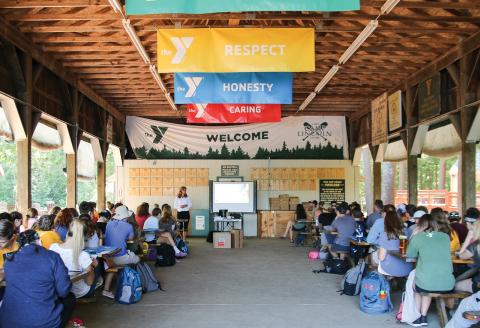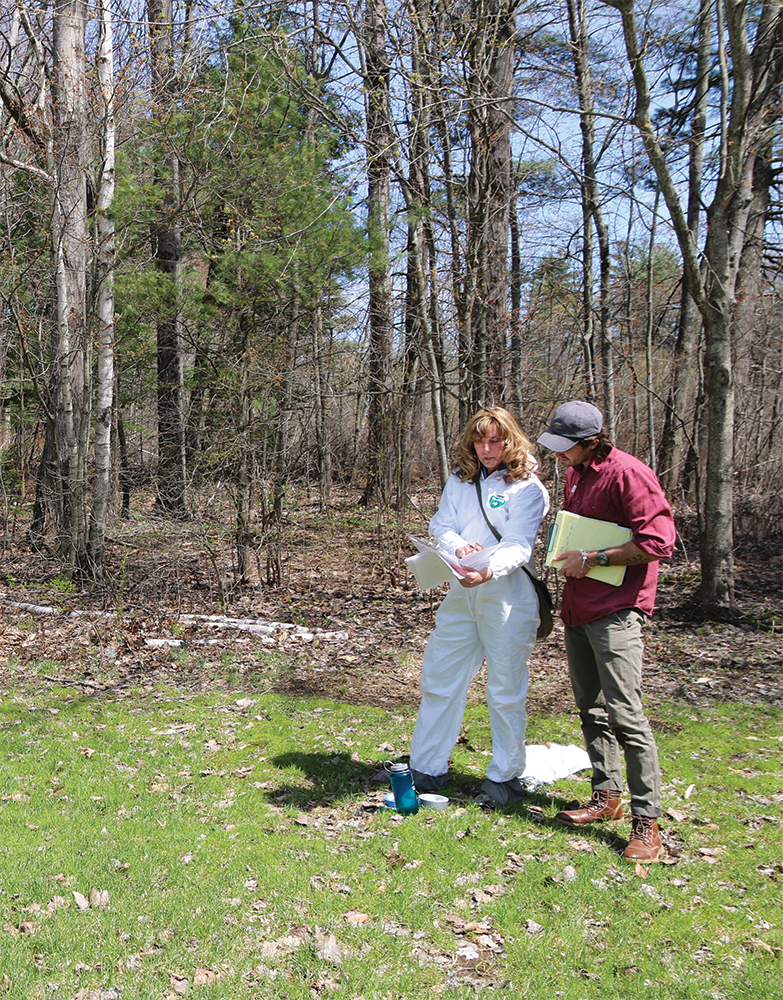Keeping Camp Safe

 Late-day sun trickles through the tree canopy and glistens off the still waters of Great Pond at YMCA Camp Lincoln in Kingston. It’s early June, and camp is gearing up for a summer of outdoor adventures. Groups of counselors scatter about the camp learning new skills with directors and managers to ensure the 2019 summer camp experience is fun, enriching and—most importantly—safe for attendees.
Late-day sun trickles through the tree canopy and glistens off the still waters of Great Pond at YMCA Camp Lincoln in Kingston. It’s early June, and camp is gearing up for a summer of outdoor adventures. Groups of counselors scatter about the camp learning new skills with directors and managers to ensure the 2019 summer camp experience is fun, enriching and—most importantly—safe for attendees.
Sharp whistles and claps from camp directors prompt counselors to gather in the large outdoor pavilion as Rachel Maccini, program coordinator in pesticide safety education at UNH Extension, prepares to give a presentation.
The setting may look idyllic, but there are hidden dangers that require skill and awareness to mitigate. Rockingham County remains a hotbed of tick activity. Rising temperatures and suburban developments have contributed to growing populations of the disease-carrying ectoparasites. Additionally, the 2015 New Hampshire tickborne disease prevention plan documents that Lyme disease rates are highest among children ages 5-14 years, the age range of many of New Hampshire’s summer camp attendees.
This information, all highlighted in the Seacoast Public Health Network’s tick-safe practice plan of action, brought the mission of a new initiative into focus: to increase knowledge of tick-safe practices among youth and their caregivers. Mary Cook, public health emergency preparedness manager for the Seacoast Public Health Network, reached out to UNH Extension and Maccini.
“It was important for us to have a knowledgeable trainer about ticks conduct the program,” Cook says.
Maccini has been working closely with the group, convened in 2018 by the Seacoast Public Health Network, to design an educational program for camp counselors to keep at-risk populations safe from ticks and tick-borne diseases.
“We have 70 acres with woods and 600 campers,” assistant camp director Reid Van Keulen says. “It’s important for staff to be knowledgeable, prepared and to know the potential risks associated with ticks.”

Counselors are high schooler and college students. Some counselors are from other countries and may not have grown up in an area where ticks are a health concern, while others may not identify themselves as part of an at-risk population.
Extension’s work at Camp Lincoln began in April. Maccini met with Van Keulen to identify potential hot spots of tick activity. The duo surveyed areas to learn more about tick populations and kinds of tick species present at Camp Lincoln. Maccini incorporated this information into her custom presentation to the counselors, hoping they will use it as they plan activities and hikes around potentially dangerous areas.
Teddy Brown of Newton teaches archery at Camp Lincoln. “I found the training helpful. I had some knowledge about ticks, but this taught me a lot, like the differences between deer and dog ticks,” he says.
Cook is already seeking funding to replicate this program and reach even more camp staff and caretakers.
“We’re really happy that Camp Lincoln is being proactive,” she says. With the help of Extension and the Seacoast Public Health Network, counselors can feel confident about tick preparedness while making more time for what camp is all about—fun.

